Intel Core i7-9700K 9th Gen CPU Review: Eight Cores And No Hyper-Threading
Why you can trust Tom's Hardware
Adobe Creative Cloud
Even though this suite has a few parallelized workloads, its final score is heavily influenced by the lightly-threaded tasks common in most desktop applications.
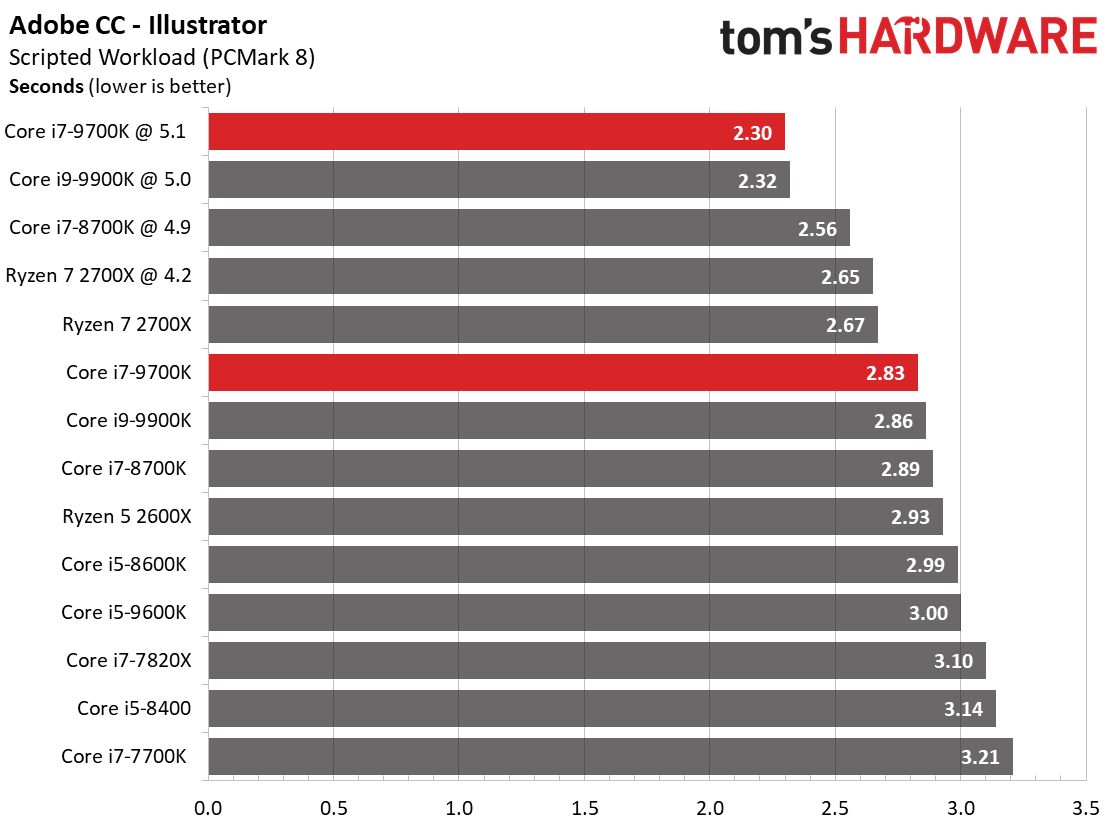
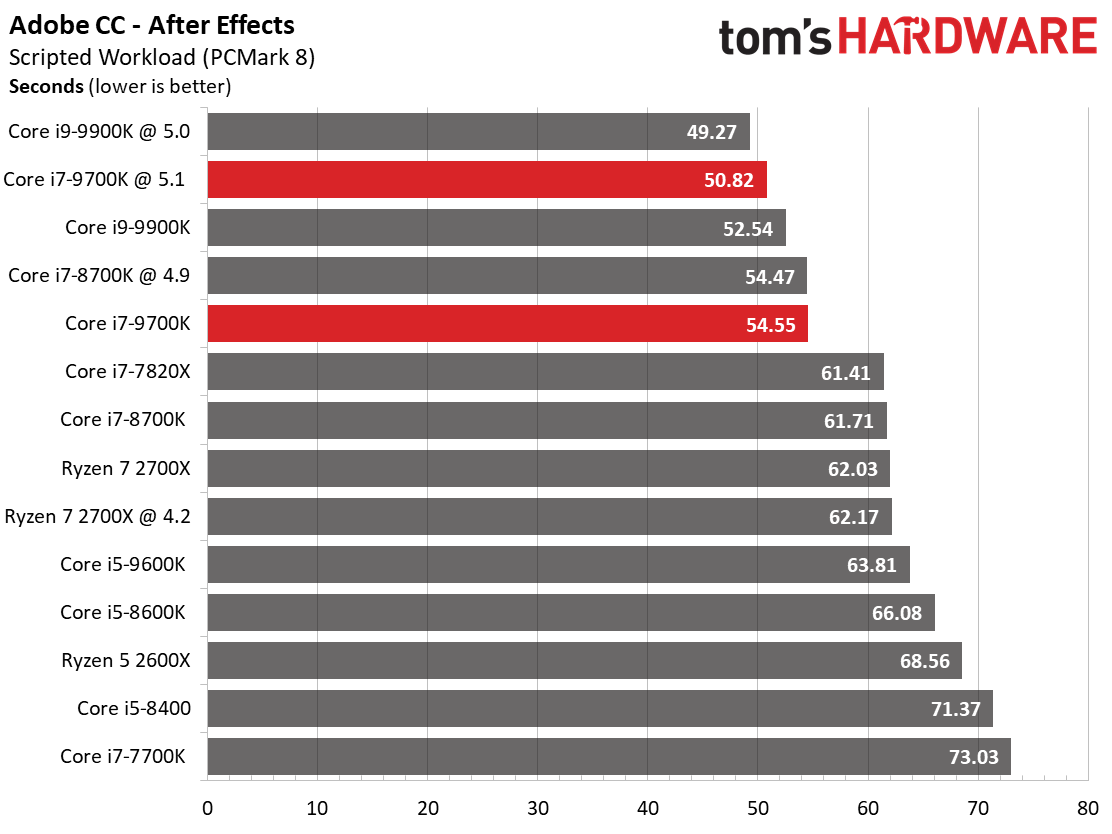
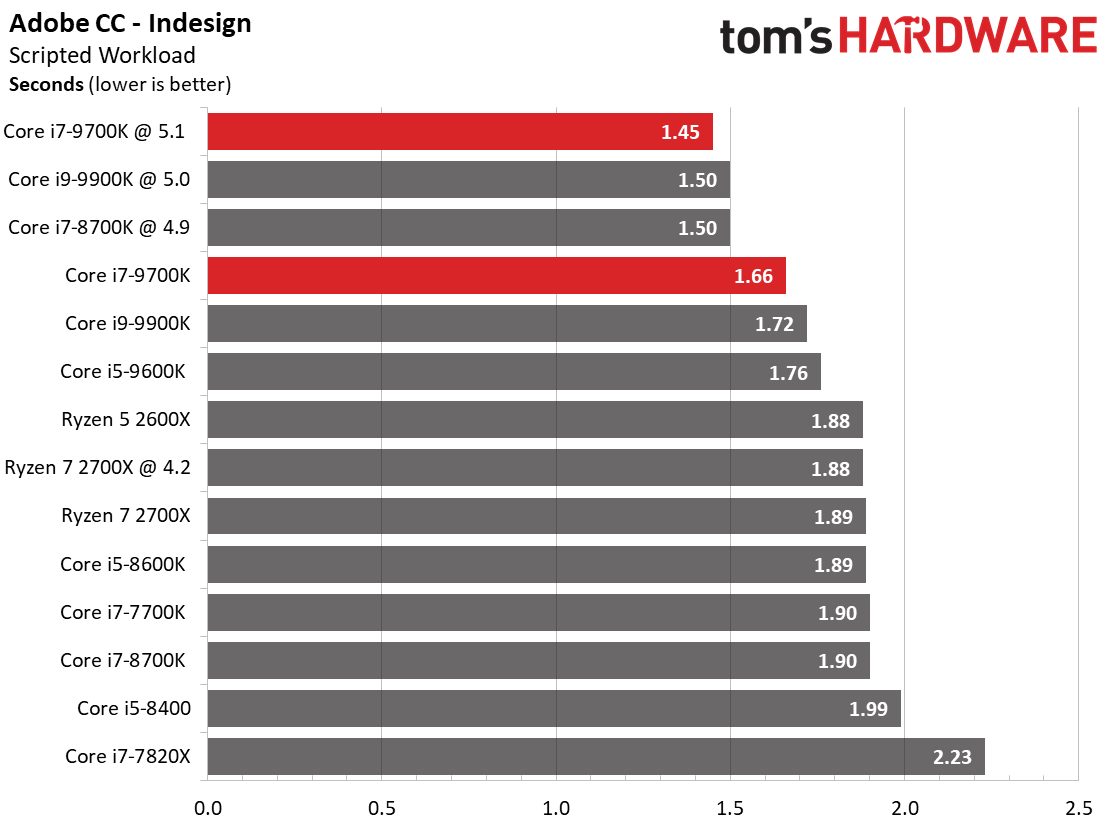
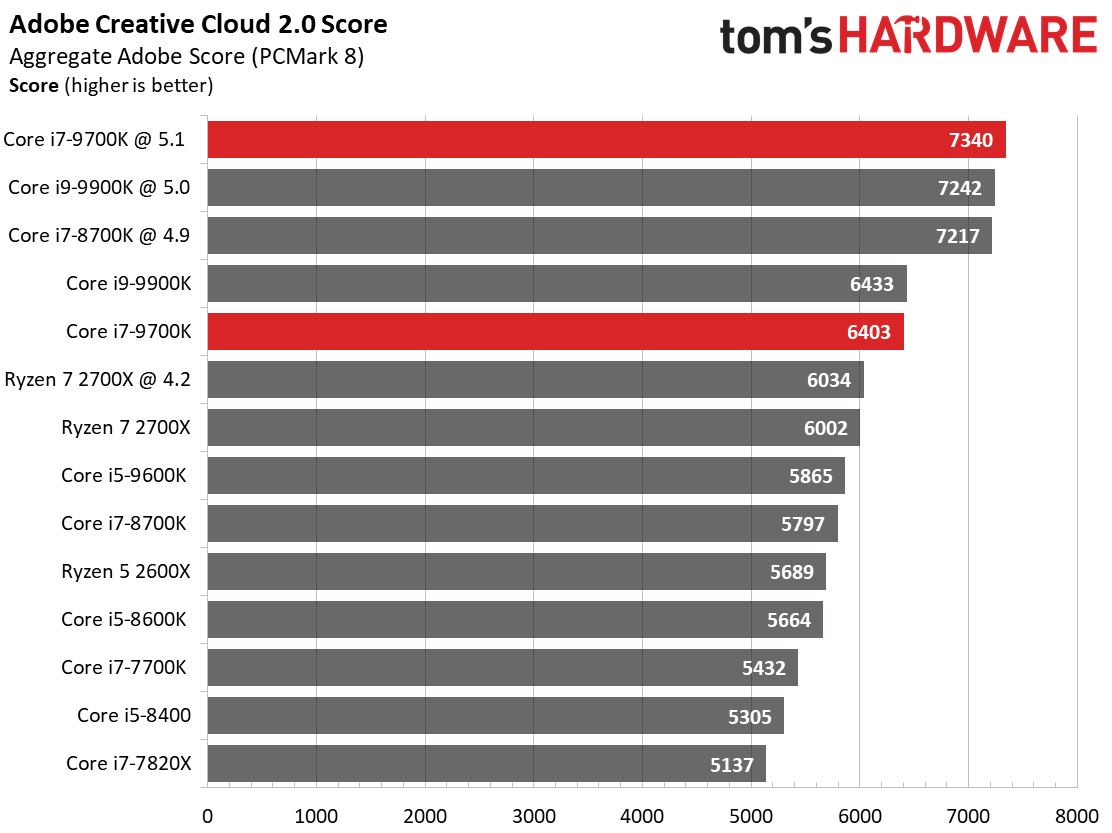
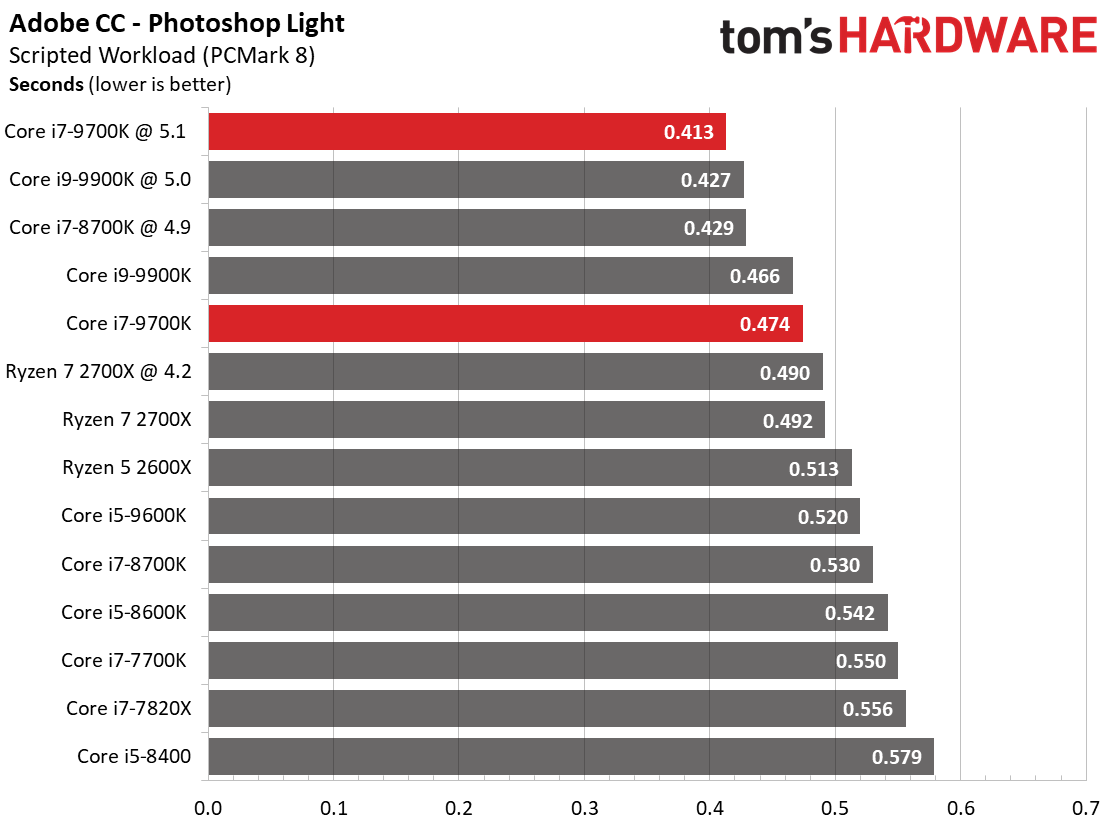
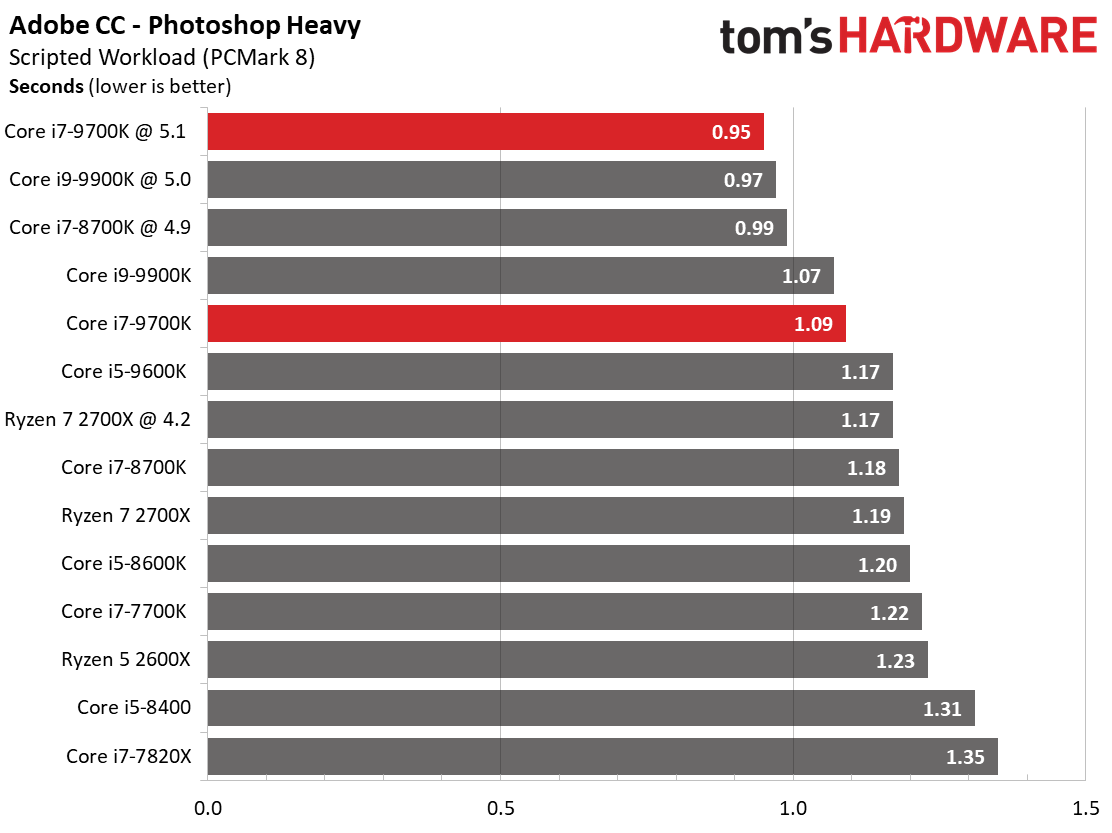
Core i7-9700K challenges the i9-9900K across our Creative Cloud suite, essentially tying Intel's "mainstream" flagship in the overall index and carving out an impressive lead after overclocking. A combination of Intel's per-core performance advantage and eight real execution cores drives results we wouldn't have imagined a couple of generations ago.
Web Browser
The Krakken suite evaluates JavaScript performance using several workloads, including audio, imaging, and cryptography. Like most browser-based benchmarks, single-threaded performance reigns supreme. These tests expose the trade-offs you make for an all-core overclock, particularly with the second-gen Ryzen processors.
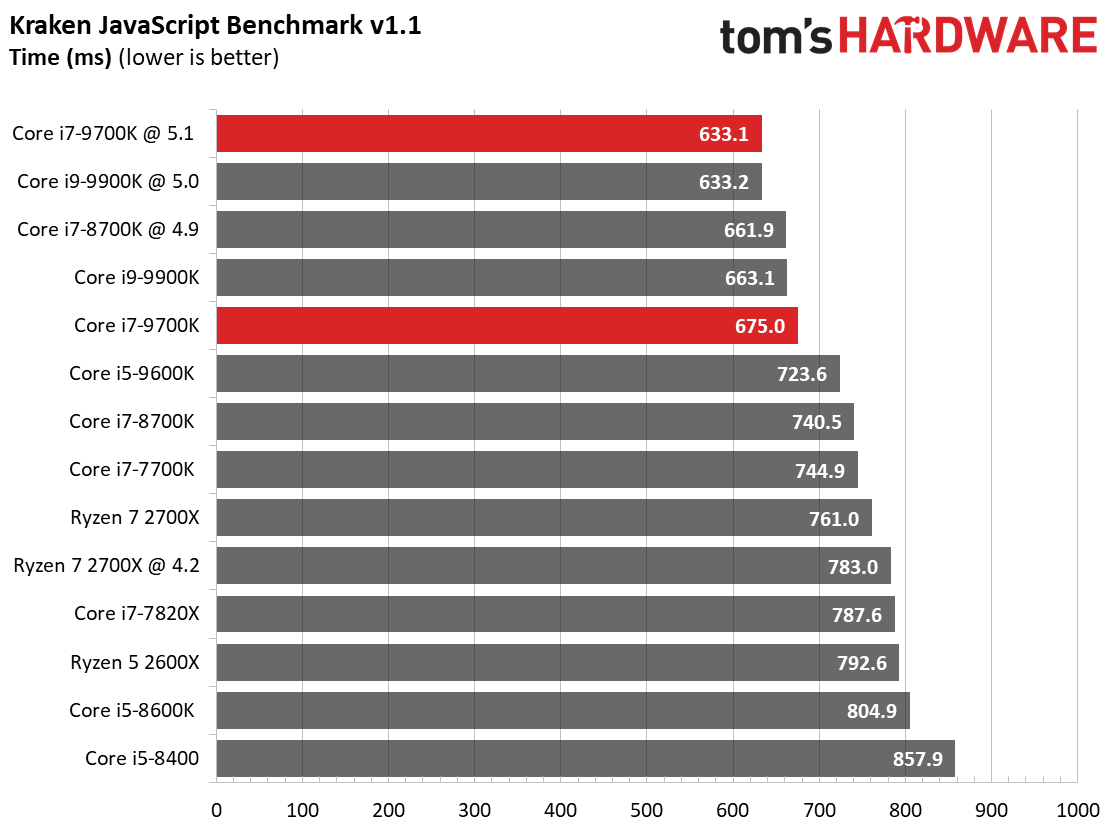
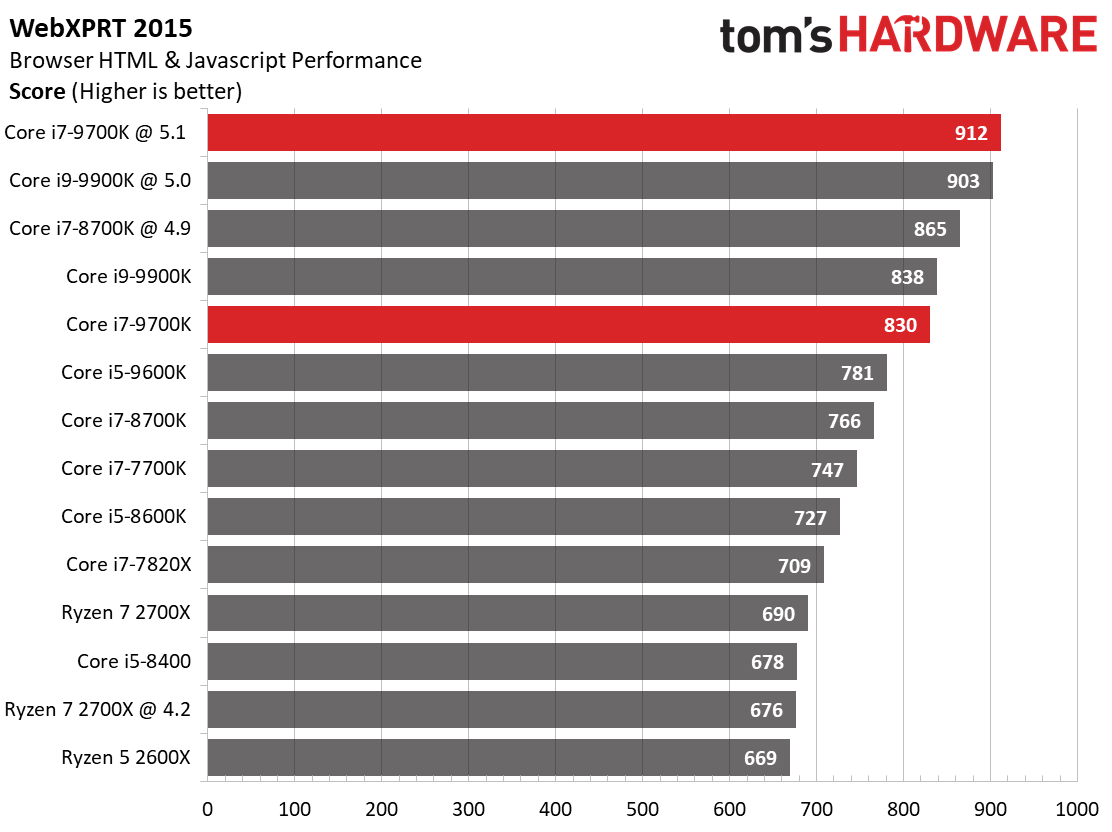
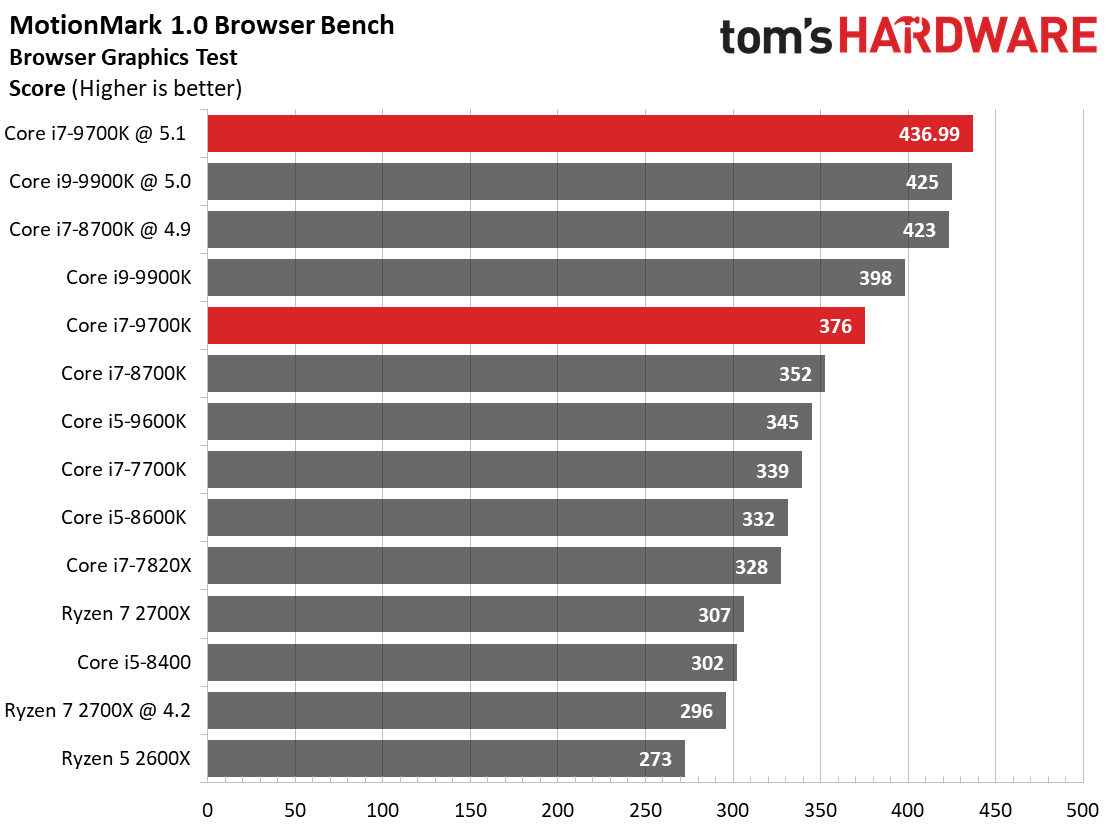
Core i7-9700K is impressive even at its stock settings, mostly matching the i9-9900K. Intel's flagship does eke out a win in the Motion Mark test, which is a measure of how effectively the CPU can push the graphics subsystem.
Overclocking turns the tables though, and Core i7-9700K dominates at its 5.1 GHz clock rate.
Productivity
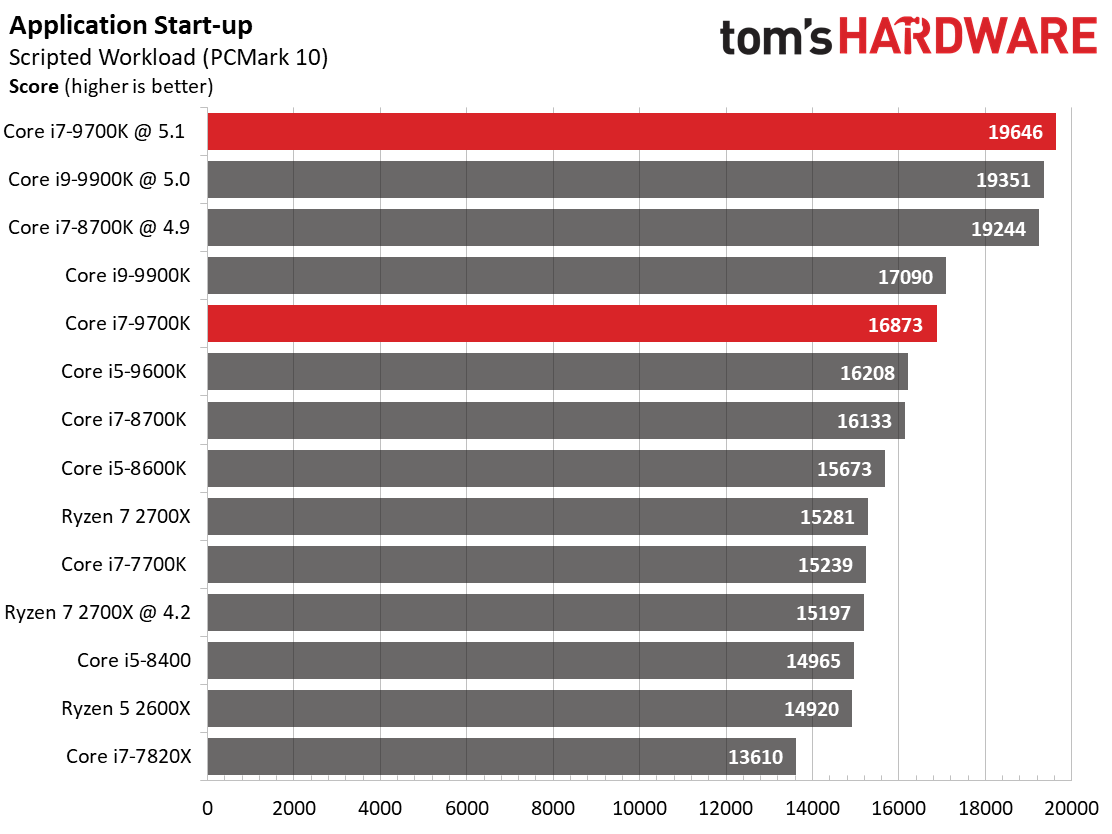
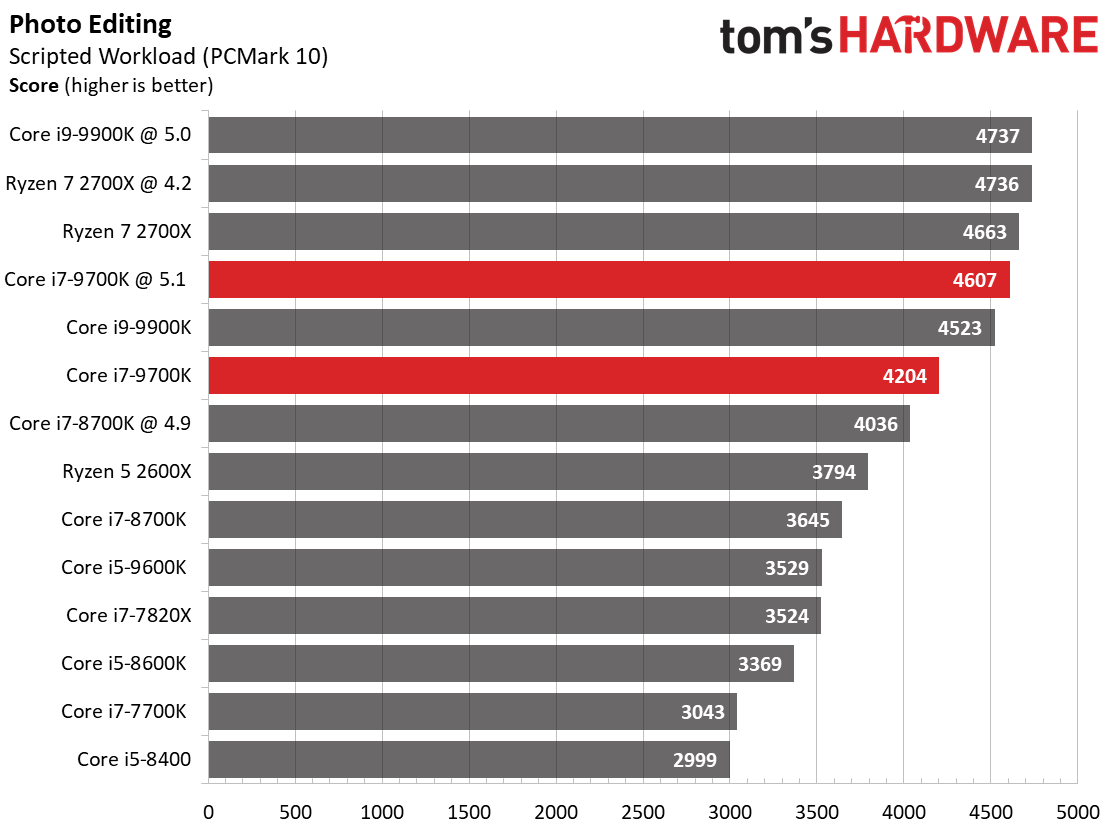
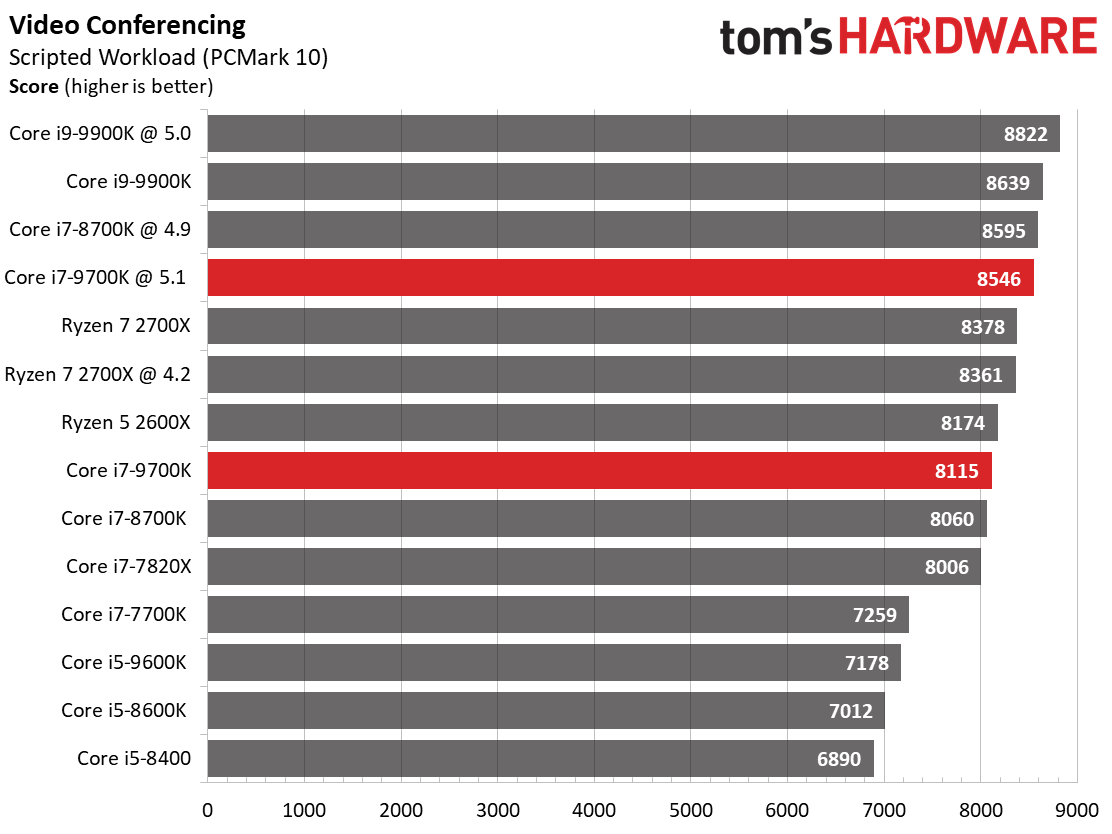
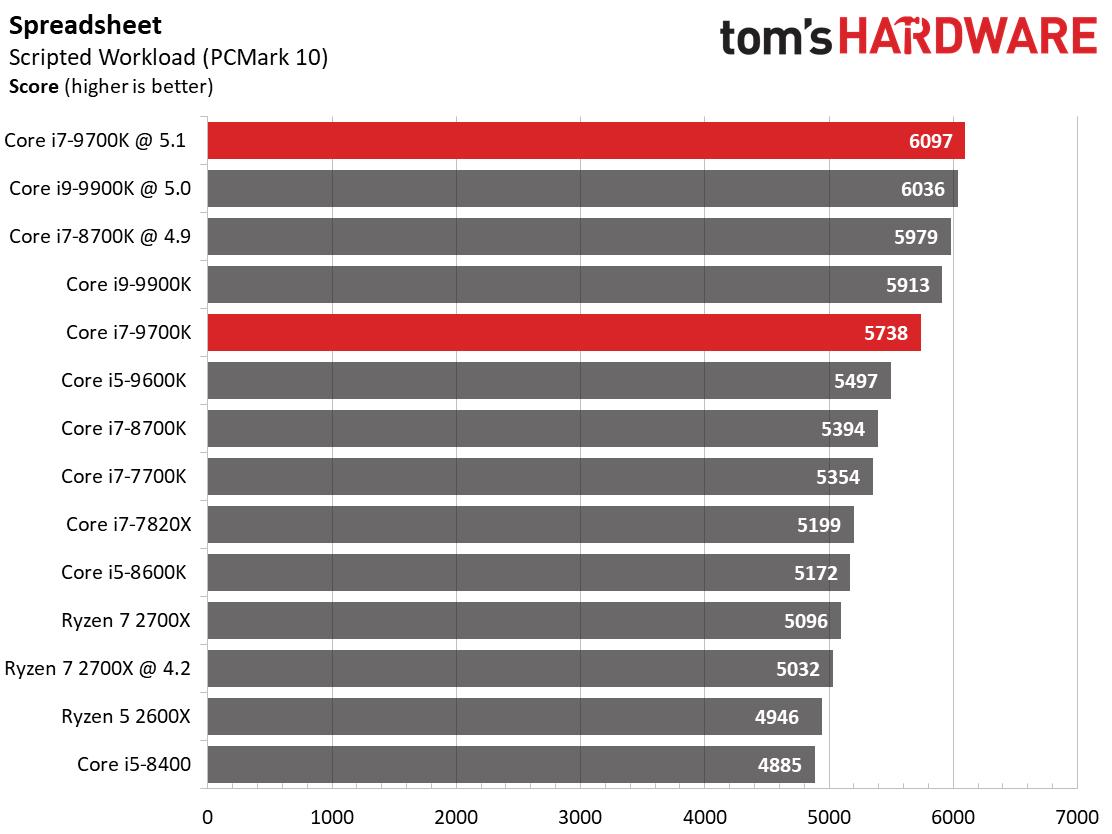
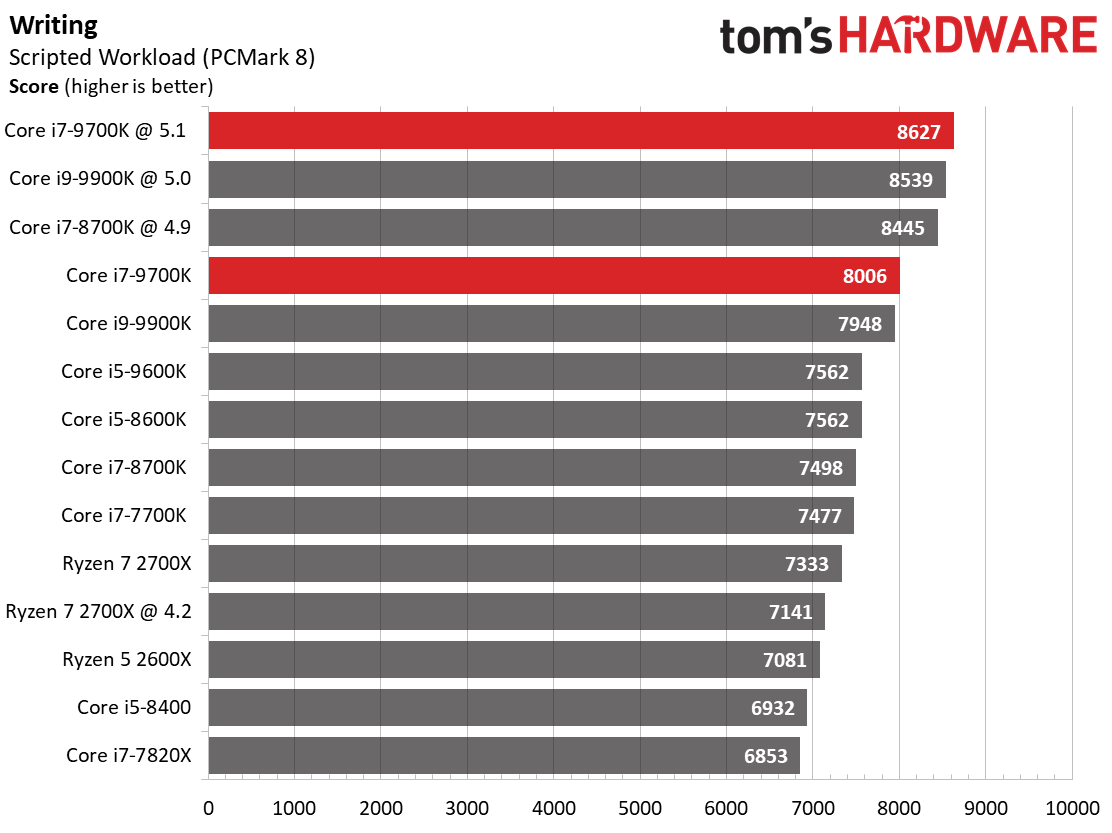
The application start-up metric measures load time snappiness in word processors, GIMP, and Web browsers under warm- and cold-start conditions. Other platform-level considerations affect this test as well, including the storage subsystem. Single-core performance drives responsiveness in most applications, so Intel's processors stack up in the expected hierarchy based on their frequencies.
Our video conferencing suite measures performance in single- and multi-user applications that utilize the Windows Media Foundation for playback and encoding. It also performs facial detection to model real-world usage. This workload responds well to available resources, so AMD's Ryzen family pops back up near the top of our chart. Core i7-9700K trails the Ryzen 5 slightly, but overclocking helps get it above Ryzen 7 2700X.
Get Tom's Hardware's best news and in-depth reviews, straight to your inbox.
The photo editing benchmark measures performance with Futuremark's binaries using the ImageMagick library. Common photo processing workloads also tend to be parallelized, so the eight-core CPUs from Intel and AMD lead the field. Still, AMD's SMT-equipped Ryzen 7 2700X sets itself apart from Core i7-9700K. Even after tuning, Intel's top-end Core i7 lags the Ryzen chip.
MORE: Best CPUs
MORE: Intel & AMD Processor Hierarchy
MORE: All CPUs Content
Current page: Office and Productivity
Prev Page Shadow Of War and Project CARS 2 Next Page Rendering, Encoding and Compression
Paul Alcorn is the Editor-in-Chief for Tom's Hardware US. He also writes news and reviews on CPUs, storage, and enterprise hardware.
-
rantoc Considering the amonth of security flaws that have been found lately the lack of HT could become a blessing in the end!Reply -
logainofhades I would like to see a locked at same clocks review, for these CPU's. It seems you really have to push Intel, to handily surpass AMD. It reminds me of the FX vs Sandy bridge days.Reply -
ingtar33 Well I just went from an I5-4690K to an AMD Ryzen 7 2700 after seeing the price of intel's current lineup, and knowing that Ryzen2 is coming in another 6mo or so. Personally I thought it was a no brainer, since the 7 2700 could be had for $260, mine is in an mitx build right now with a little Kracken M22 cooling it, and as I type on it it's currently plugging along at 4.2 ghz with DDR4 3600 ram in it.Reply
What point am I making? Well, the motherboard, cpu cooler and cpu combined were cheaper then this i7 in this review. chew on that. And remember that ryzen2 should be out sometime in the spring of 2019, and it will be completely compatible with everything I just purchased while being on par with or even faster then this last intel chip.
Now that you've chewed on that for a bit, ask yourself "why did THG stamp an editor approval on this chip again?" We probably should, "Just buy it," I guess, and not ask so many questions. -
ingtar33 Reply21463450 said:I would like to see a locked at same clocks review, for these CPU's. It seems you really have to push Intel, to handily surpass AMD. It reminds me of the FX vs Sandy bridge days.
except that's not what we're seeing. 105.5 fps vs 94.9 fps is 10.4%, a 10.4% improvement for the 8c16t intel core i9-9900k. yet the chip is running at 5.0ghz vs the 8c16t ryzen 7 2700x at 4.2 ghz, which means the intel is clocked about 19.0% faster then the AMD to get a 10.4% lead in FPS.
These Intel cpus DO NOT have higher IPS then Ryzen. If anything, assuming there isn't some sort of scaling issue in the testing suite, this seems to indicate that intel's cpus have moderately less IPS then AMD Ryzen+ and are currently getting by with clock speed alone. Which means this is as far away from sandy bridge vs fx then we could get. Sandy bridge didn't just clock to 5ghz, but was sporting almost 40% better IPS then Piledriver FX cpus. -
InvalidError Reply
You are getting product and code names confused. Ryzen 2 (Zen+) has been out for over six months already and your new Ryzen 2700 is one of those. Ryzen 3 (Zen 2) is what's coming out in 2019 on 7nm.21463471 said:And remember that ryzen2 should be out sometime in the spring of 2019 -
adam.oakes83 INGTAR33, you can't just make up results and claim tReply
It to be proven actuate by doing a math equation. 99.99% of the internet making claims with no source to back it up. -
TerryLaze Reply21463503 said:except that's not what we're seeing. 105.5 fps vs 94.9 fps is 10.4%, a 10.4% improvement for the 8c16t intel core i9-9900k. yet the chip is running at 5.0ghz vs the 8c16t ryzen 7 2700x at 4.2 ghz, which means the intel is clocked about 19.0% faster then the AMD to get a 10.4% lead in FPS.
These Intel cpus DO NOT have higher IPS then Ryzen. If anything, assuming there isn't some sort of scaling issue in the testing suite, this seems to indicate that intel's cpus have moderately less IPS then AMD Ryzen+ and are currently getting by with clock speed alone. Which means this is as far away from sandy bridge vs fx then we could get. Sandy bridge didn't just clock to 5ghz, but was sporting almost 40% better IPS then Piledriver FX cpus.
This only works if you don't know CPU and GPU utilization.
Looking at a lot of gaming benchmarks even the i3/pentiums/2400g etc are only 10-20% below the 9900k because gaming benchmarks are made to push the GPUs and not the CPUs so the GPUs bottleneck way before the CPUs,and even if they don't, scaling in games means that slower CPUs can just use more threads to get to the same FPS.
Look at CPU benchmarks the deficit the ryzen CPUs have there is still there in gaming it just shows in the utilization where the ryzen cpu will have 30-40% more utilization (2700x vs 9900k) . -
Dantte PCgamers did some testing delidding a 9900K and determined that the solder TIM does NOT provide any additional cooling when compared to a 8700K because the die is much thicker (about 32% thicker) and hampers the transfer. Also the solder is too thick as well.Reply
They tested and proved this theory by delidding and replacing the solder with conductonaut and got a 8C decrease in temps. Then they lapped the die -.15 and -.20mm and retested which came back with even lower results. -
t99 Glad I went with a 2600 for only 150$ new and just OC if needed. Basically a 2600x and the avg is within 20% of an OC'd 9900k and 10% of 8600k.Reply
When you account for the difference in cooling and motherboards as well you can get a 2600 + 1070ti for price of a 9700k.
Maybe we will see larger gaps with the new intel when they test 1080p on a 2080. So glad I didnt wait and go with one of these